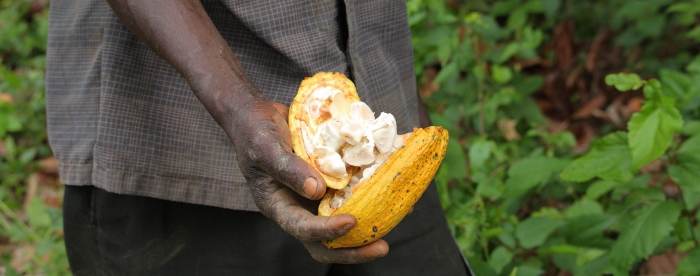Ghana, Ivory Coast and Colombia together account for two-thirds of global cocoa production, with Ghana and Ivory Coast accounting for 70 percent while Colombia accounts for 1 percent. However, this feat is achieved at the expense of the tropical forests of these three countries since deforestation is relatively high in all three countries due to the fact that primary forests are continually being cleared for the cultivation of this important cash crop and other food crops.
Since the early 1990s, Ghana has lost more than 33.7 percent of its forests, which corresponds to 2,500,000 hectares mainly due to logging, unsustainable farming, bushfires, mining and infrastructural development. Ghana’s deforestation rate between the period of 2005 and 2010 was projected at 2.19 percent per annum, making Ghana the sixth highest most deforested country in the world for that period (FAO, 2010). (https://theredddesk.org/countries/ghana)
This has necessitated the need for beneficiaries of this cash crop, namely, chocolate and cocoa companies to step in to curtail the impact of the crop on tropical forests by introducing initiatives designed to mitigate the role of cocoa cultivation in the deforestation of tropical forests.
The response to this challenge culminated in the establishment of the Cocoa and Forests Initiative (CFI), under which ‘Frameworks for Action’ have been signed between Ghana, Ivory Coast and Colombia and leading chocolate and cocoa companies to arrest deforestation by no longer converting forestland into cocoa farms or plantations while working to restore forest areas that have already been degraded.
In Ghana, Civil Society Organizations (CSO) working in the forest and cocoa sector have made their inputs into the ‘Frameworks for Action’, implementation plan under which the establishment of illegal cocoa farms will also be outlawed, forest policies will be more effectively enforced and alternative livelihoods will be developed for affected farmers.

More CSOs participated in the CFI process which had hitherto, been passive and limited to a few organisations as a result of lobbying and advocacy for wider CSO involvement by Tropenbos Ghana, EcoCare Ghana and Forest Watch Ghana with support from Partnership for Forest.
The enhanced participation saw more CSOs scrutinizing CFI’s thematic areas and suggesting actions to enable it to realise its intent. This ensured that wider perspectives were brought into the CFI process thus guaranteeing its successful implementation.
The Actions which are aligned with the Paris Climate Agreement were signed on November 17th, 2017 with Ghana and Ivory Coast and on July 18, 2018 with Colombia. They are expected to play a crucial role in sequestering carbon stocks and helping to mitigate Climate Change both locally and globally.
These activities are part of the EU-financed project “Strengthening the capacity of non-state actors to improve FLEGT-VPA and REDD+ processes in Western Africa”, implemented by Tropenbos International.

